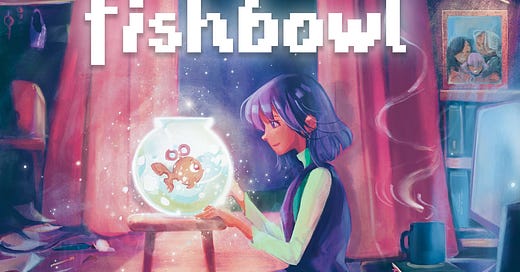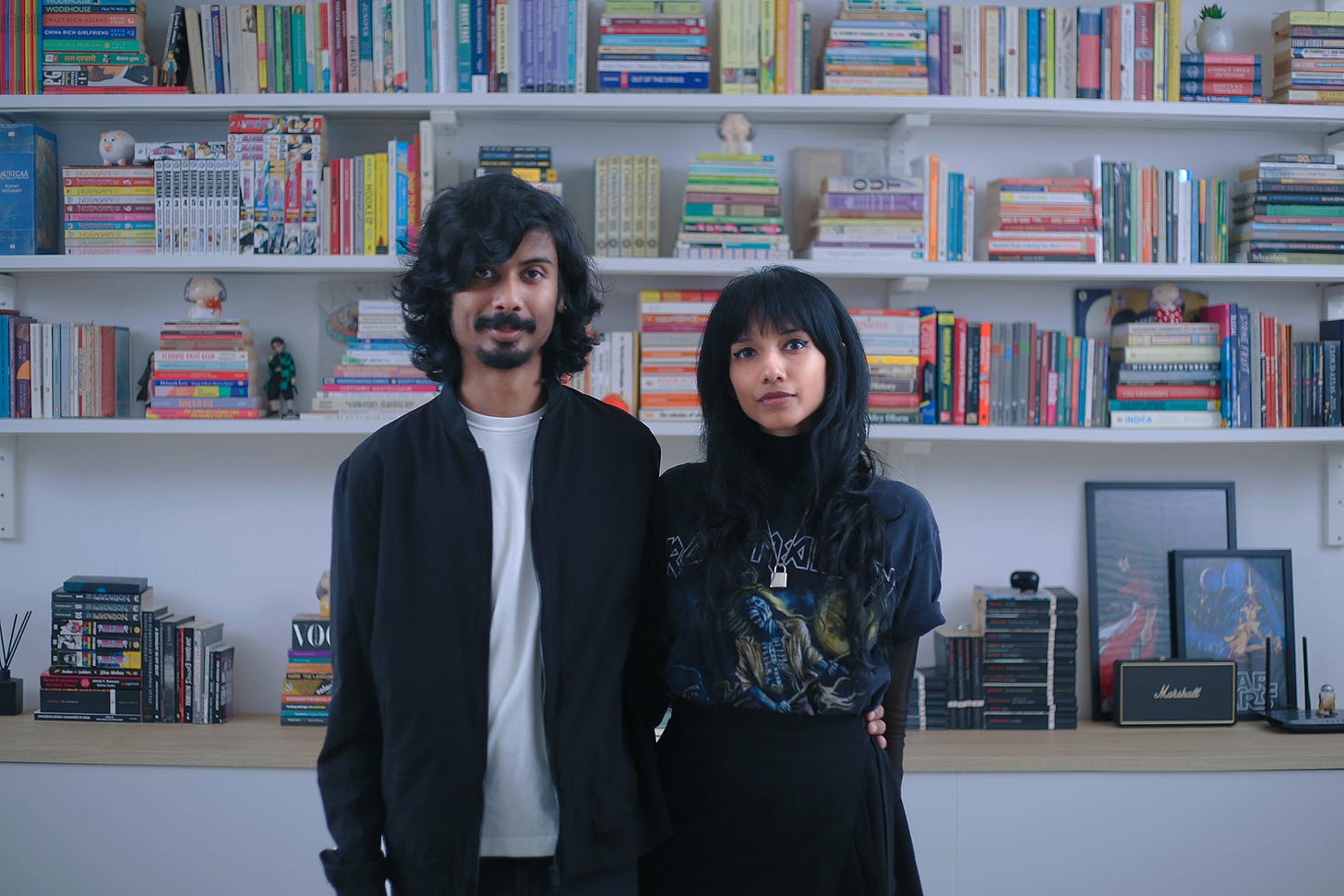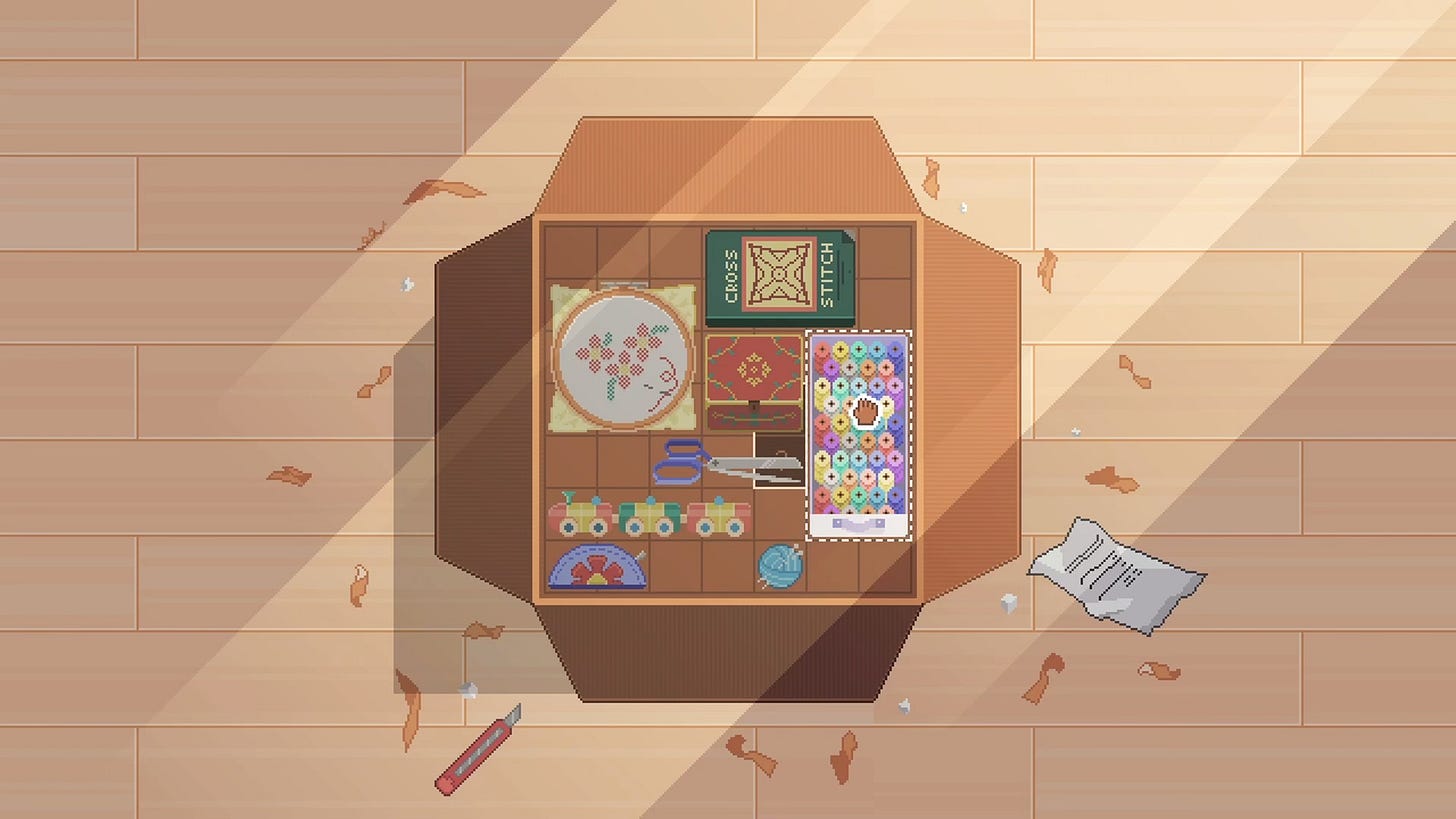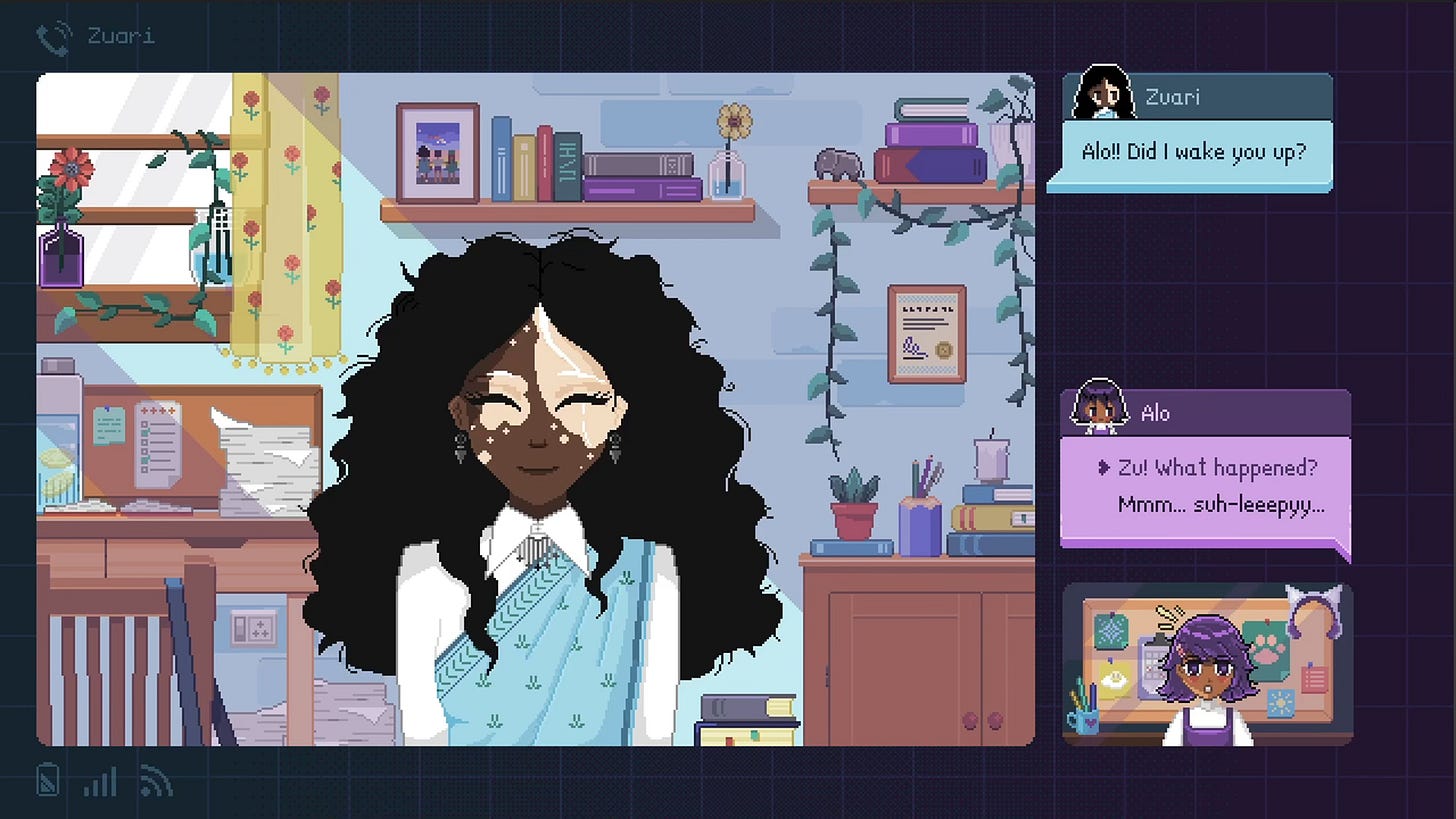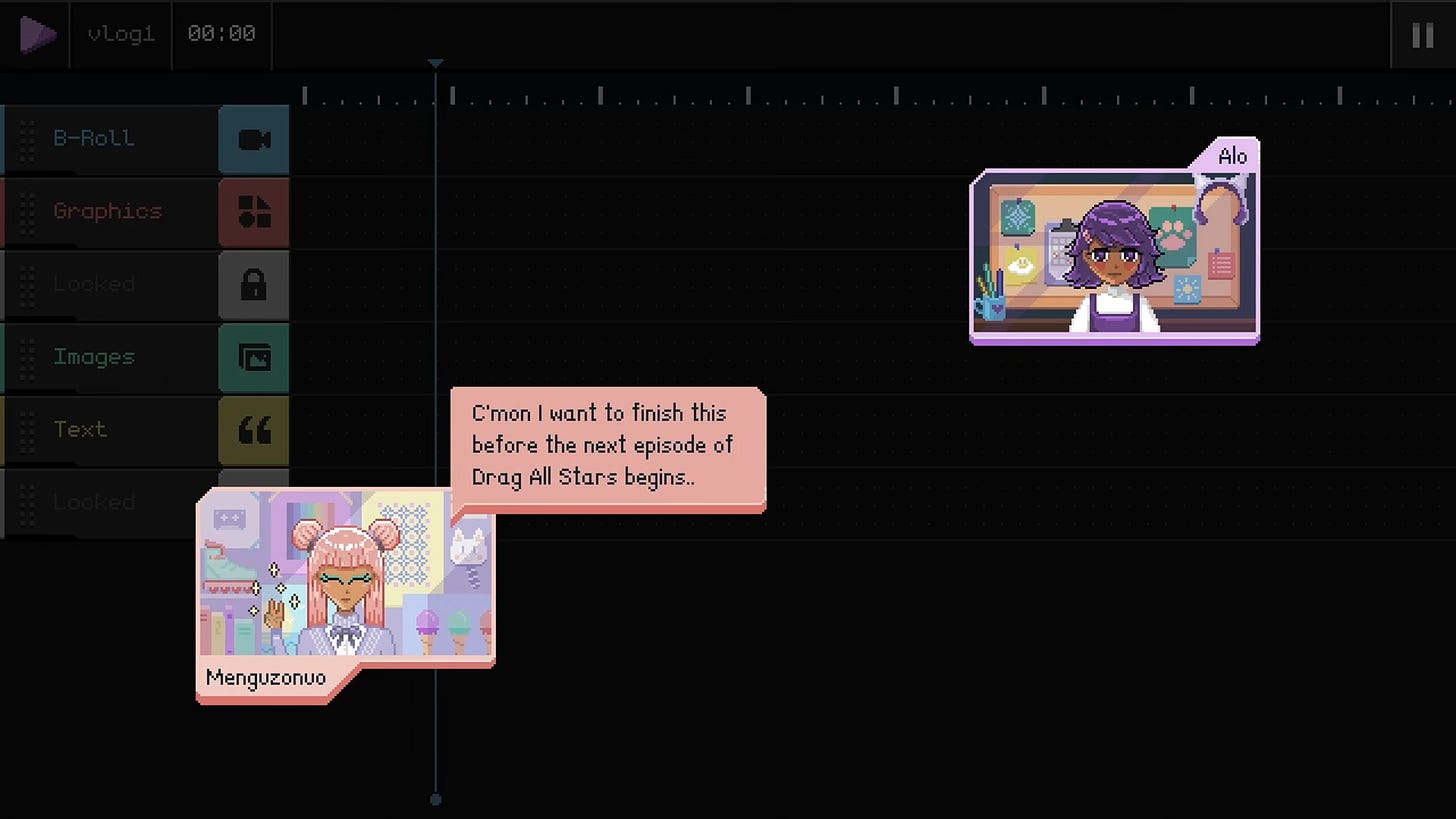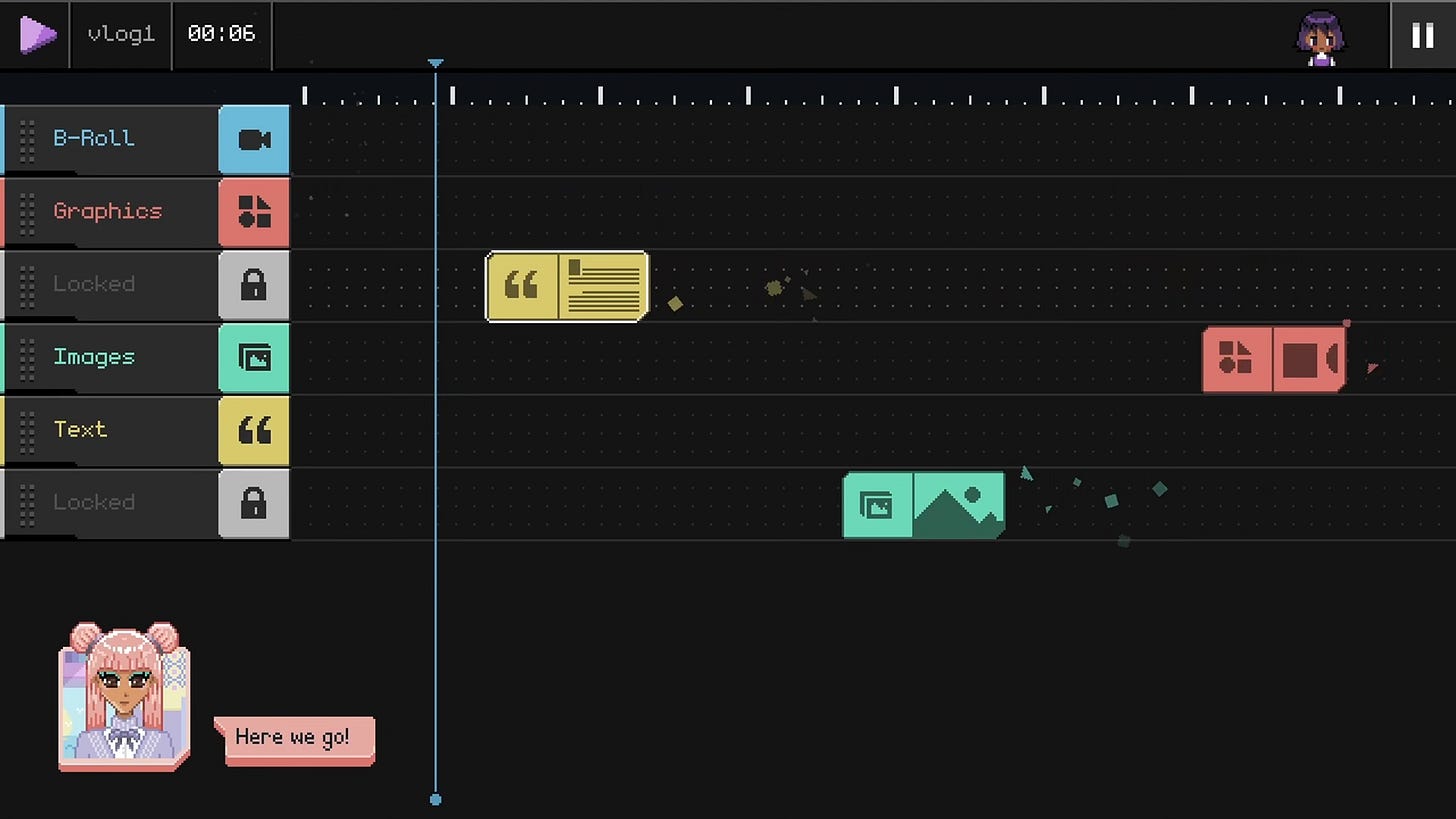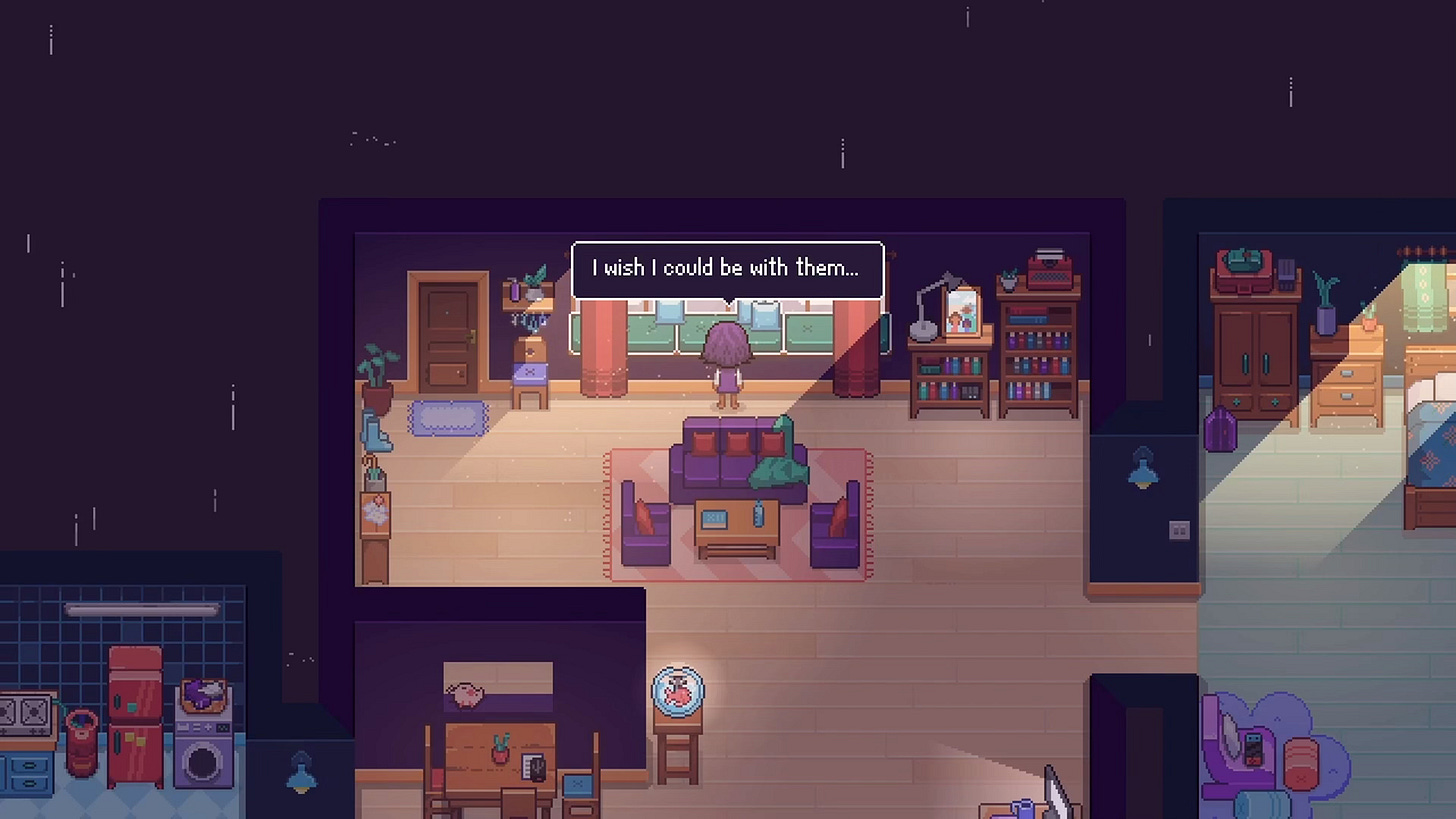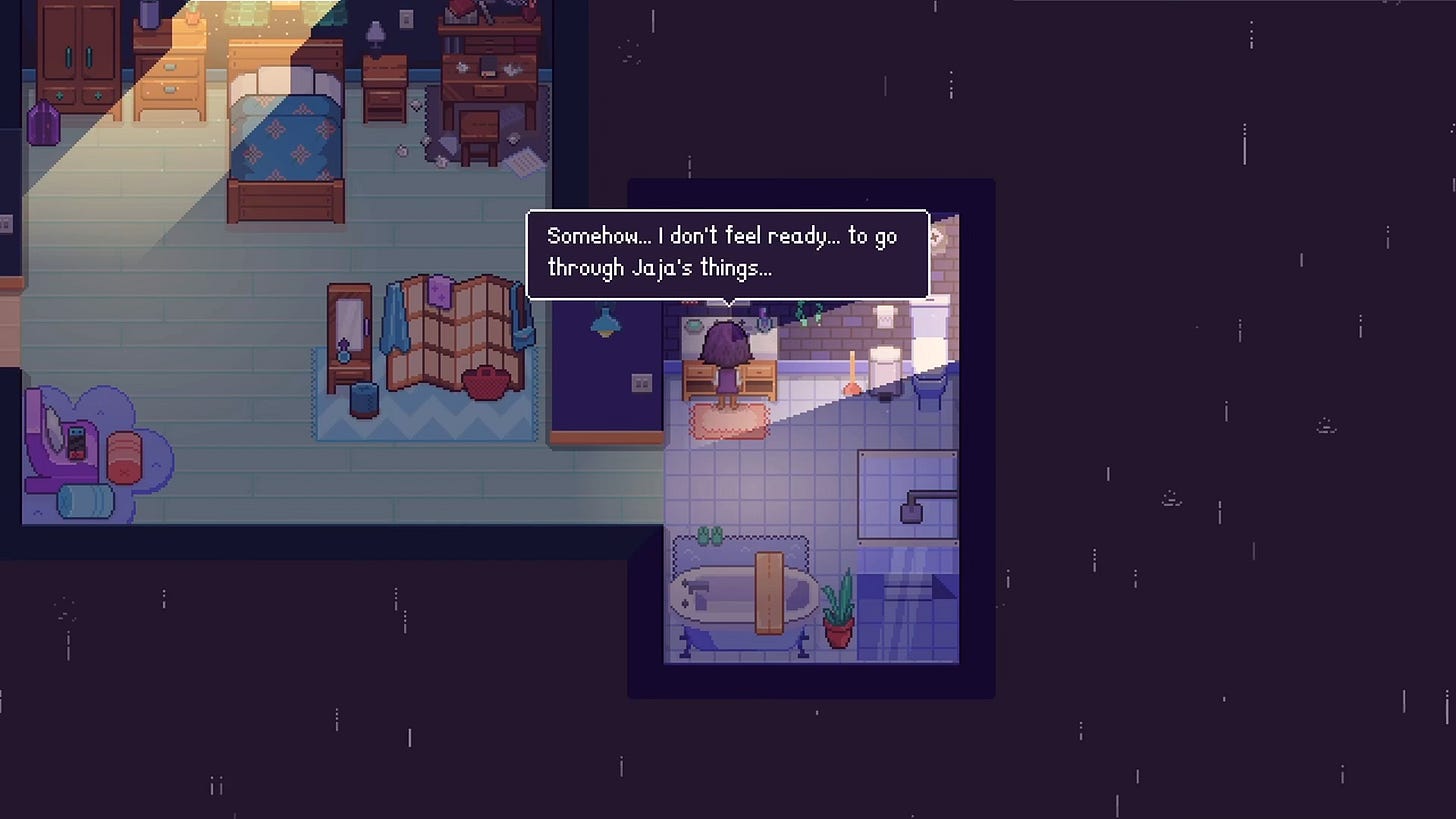Exclusive: Fishbowl Developers on Building for PS5, Steam Deck Support, Regional Pricing, and the Challenges of Indie Game Development
Plus: how demos impact game development, their writing process, and a whole lot more.
One of the more interesting games from Sony’s India Hero Project line up is Fishbowl. Developed by Goa-based imissmyfriends.studio, it’s a visual novel told over the period of a month. Like other titles greenlit by Sony, Fishbowl is coming to PS5 and PC (via Steam). There’s a demo on both platforms too. While it’s a small slice of what to expect from the full release, it’s expertly-paced and revealed just enough to want me to check out the game when it’s out. Essentially: it did what a good demo is supposed to do, get me invested in what to expect from the full release. A rarity in an age of established franchises, forever games, and live service dreck.
Naturally, I had to reach out to the developers to know more. Turns out that imissmyfriends.studio is a two-person indie outfit consisting of Prateek Saxena and Rhea Gupte. They were generous enough to wax eloquent (with exceptional clarity I might add) on what to expect from Fishbowl, their inspirations, what they learned from their demo release, what it’s like working with Sony, what their writing process for Fishbowl is, and a whole lot more. Some responses have been edited slightly for clarity and length.
For the uninitiated, could you give us a brief background of your game development journey?
Neither of us have a background in game development, it has been something we were keen to do for many, many years. But at the time, financial security took precedence over creating a game. We pursued careers in other fields, Prateek in UI/UX design for a non-profit and Rhea as a fashion and fine art photographer.
Over the years, we dreamed of making games someday and were keen to save up enough to be able to do this one day, without having to go back to other professions if it didn’t work out, as is common with indie games and how the game industry is. We were also learning and developing skills on the side which would hopefully help when the day came. We made lists of ideas of stories that we’d tell someday and mechanics that would be interesting to players. Discussing games and what we’d make was a part of our lives, even though in our heads we were far from reaching our starting point.
The pandemic changed that, work travel had completely halted and that allowed for time for collaboration which we didn’t have previously. In 2020, we started working on a visual novel which we soon abandoned as working part-time was hard. Later in the same year, we started work on another “not-so-visual-novel” with a tiny scope which we actually saw to completion after about six months of part-time development. We launched the project on itch.io but have since taken it down as we are keen to expand the universe and characters into a bigger game in the future.
After completing this project, we were really optimistic about making an indie game with a small scope, part-time, and felt we closely understood the hardships that came with it as well as the thrill of putting something together and having people experience it. We knew we wanted it to be for PC/Console as that market was most suited to the kind of stories we wanted to tell and it made sense to grow a community there from our first project itself. That is how the idea of Fishbowl was born and we have been working on it ever since, first part-time and then full time since last year.
What's Fishbowl about and what can players expect at launch?
Fishbowl is a heartfelt coming of age story told over a month where you unpack puzzles to rediscover childhood memories, video call loved ones, work from home while taking care of yourself and your chores, to figure out life one day at a time.
Our protagonist is twenty-one year old Alo who gets her first job in a new city and is living by herself while grieving her grandma’s death, the choices she makes each day will lead to a unique journey of self discovery.
Fishbowl tells a unique story set in urban India at the onset of the pandemic. Alo’s journey in the game will be determined by the choices that players make. We have a cast of diverse characters with deeply touching stories of their own. The game will first launch on PS5 and Steam.
What are the inspirations for Fishbowl and how long has it been in development?
Fishbowl was created from our need to tell a story from India with an impactful emotional resonance for everybody who plays it. Losing a loved one is a difficult experience for everybody. In Fishbowl, we show grief as something that becomes a companion with changing forms through Alo's journey. Loss in our own lives formed a basis for us to tell this story.
We both enjoyed playing pixel art games since we were kids so that art style was a big inspiration for us. We were keen to create Indian characters and objects in this style, something we didn’t see growing up.
In terms of games, To the Moon has been one of our biggest inspirations, its impactful story stayed with us years after having played it. Isao Takahata’s film Only Yesterday was another big inspiration, its simplicity and masterful execution allows for a connection with the characters, their thoughts and journey like no other, within the most humble premise.
We started working on Fishbowl part-time in April 2021 and continued part-time for about two years before taking the leap of switching to full time.
How did you go about researching the topics it deals with and what was the reason for this choice of theme?
The game is a mix of our own experiences and of course, completely fictitious, imaginary scenarios. Journeys we were keen to take our characters on.
There wasn’t specific research conducted for Fishbowl in terms of the themes, but allowing for our imagination to run with empathy for our characters, their situations and their stories.
We chose these themes as we felt we could tell an authentic story around them, one we had experienced ourselves and also allow for play as well as multiplicity within it, to reflect how different people could possibly experience such a life event.
There was a lot of brainstorming and character profiles which we built to tell distinct stories which also tie into the overall narrative. It was important to know our characters as people, how do they react in particular situations, what drives them, what are their favourite snacks even. The more we got to know the characters, the more we could understand their motivations and allow for arcs which would feel satisfying and challenging to explore.
On a side note, for us, maximum research went into the making of the game as first time game developers. Picking a game engine, learning to use it, expanding our knowledge on accessibility, narrative design, art, sound, music, marketing, bizdev all the disciplines that help make a game come together, that’s where we seeked the most help from online tutorials, talks, documentation and mentors.
The Steam page for Fishbowl mentions "[I]n Fishbowl, feel all feelings as there are no right endings" as well as branching narratives. Would the full game have multiple endings?
Yes, Fishbowl has multiple main endings as well as multiple ways to reach those endings. There are little details which will change based on your actions inside Alo’s home. The branching narrative is deeply woven into the everyday actions the player chooses to participate in and has a variety of consequences, big and small, from secrets that may be revealed, additional storylines and choices that open up as well as impact the main story.
We were always keen to make the game feel ‘alive’ when players experience it, and hope we can have that come across. In how we have designed the narrative of the game, choices as well as seemingly mundane interactions truly matter in how the player’s story progresses and which ending they get. With our branching narrative and multiple endings, we hope for players to have an experience that stays with them for a long time after they finish playing our game and also intrigues them to try the options they may have not chosen in their first playthrough.
Fishbowl's art direction has a cozy feel to it despite the serious subject matter. What was the thought process and inspiration behind it?
The main thought behind this was that even though Fishbowl deals with difficult subject matters, for players to feel like they want to and could spend endless amounts of time inside Alo’s home. It stemmed from wanting players to feel at home while playing the game and, this is a leap to achieve, for them to miss their time in this home after they finish playing.
So we wanted to make the home a comfy place to be in. However, it was important to also balance that with the fact that Alo has just moved into this house and it doesn’t truly feel like her own yet. So there is a sparseness and vastness to it and something that feels uncomfortable to her still. Having this contrast be present was extremely important for players to have a visceral experience of the themes even before they know what the game is about.
Similarly, it was also important to contrast the coziness with a sense of melancholy. We didn’t want it to feel unwelcoming but still have a lingering feel of the main themes of the game. We tried our best to solidify this vision with the help of our colour palette, lighting, audio, “set design” inside the home, dialogues and of course, the rain at the beginning of the game, being an important motif to tie these all in together.
From a design perspective we've seen some interesting gameplay elements in the demo such as being able to slice up and edit videos as a puzzle. While this adds novelty, are there any mechanics or features geared towards gameplay depth? Or is the objective to guide players through its narrative with interactivity?
We always lead with the fact that Fishbowl is first and foremost a visual novel and a narrative game, so players who enjoy reading will feel most at home with our game. Our goal for Fishbowl’s gameplay is to be accessible to as many players as possible. Players can take as much time as they'd like while playing Fishbowl. There are no forced day night cycles and we provide clear objectives of what to do next. There are no timers and no fail states either, so players can comfortably play at their own pace.
Our idea behind the design of Fishbowl is to move away from the idea of giving value to the player for their skills or dexterity, but simply value them because they are. This has been the leading thought in our mind throughout the design process.
We also wanted to have gameplay which feels complimentary to the story. In Fishbowl, you play as Alo, who works from home as a video editor. The video editing game serves a narrative purpose of telling the story of what’s going on in the office during the pandemic. Through this game you get to meet colleagues who each have unique personalities and abilities which may increase or decrease the difficulty level of each editing session.
Similarly the unpacking puzzles in Fishbowl serve to tell a story of all the objects Alo’s late grandma has collected over the years. The puzzles become easier and more difficult as per Alo’s emotional journey in the game, however, they are skippable for folks who want to move ahead.
What challenges have you faced developing a game of this kind?
As first time game developers, all of gamedev feels like a challenge.
But some challenges we faced early on were choosing an engine for our game. We worked with Unity for about nine months when we first started developing Fishbowl to realise it was not the right fit for us and our project. We then switched to GameMaker which quickened our development process. We also really appreciated the available support on the GameMaker Discord server which also helped us a lot when we were stuck from time to time. Being able to talk to folks directly who had shipped projects that we look up to and having them casually help us with our bugs or doubts was quite a surreal experience. And it says a lot about the GameMaker community, how open, collaborative and helpful it is.
The second one was working on the game part-time for quite a while. It really tested our patience, discipline and motivation. There were entire months when we absolutely couldn’t even look at the game, as other work or life things took precedence. So progress was mind numbingly slow at times. But this time truly showed us how committed we were to Fishbowl and how much we wanted to tell this story. We kept coming back to it no matter what and making small progress whenever possible.
A topic that comes up often with game developers and publishers on Steam is how the current 'meta' to bring about sales success is that it's dictated by wish lists. As an indie developer that's all of two people, do you even attempt to solve for this? Or is the focus on a big release day push?
We started marketing Fishbowl pretty much when we started building it. Frankly, as two nobody game developers with no industry experience, living and working in India, we were very aware of the odds stacked against us and how much harder we’d have to work to get the story of Fishbowl out there and to build a community around it. Being an indie game developer, who is keen to make a living from making games, first and foremost means being an entrepreneur and ensuring that there are people out there who are interested in buying the game.
We started off with the #100daysofgamedev on Twitter and it was a daily motivator to keep going and to see the progress of small indie devs who were also in a similar position as us. We made friends through it and also got to support projects from the very beginning.
Almost two years before we started making the game, we started watching all the talks, documentaries, discussions we could find on Youtube from GDC, GDoc, No Clip, and many others to understand how things work, what it means to market an indie game and what has worked for small teams and solo devs. Rami Ismail, Chris Zuckowski, Simon Carless and Victoria Tran’s newsletters have been extremely valuable to us.
We were very aware that we’d have to work doubly hard in this area as first time gamedevs from an underserved region. And we want to continue making games after Fishbowl, which makes the success of Fishbowl a requirement to us. So knowing the facts for ourselves and applying our learnings to Fishbowl has been a daily practice and part of our daily discussions.
As indie devs, you have to build in your marketing plan within your development plan if you want the game to have as good a shot as it possibly can. Even with a publisher, it is very important to know and understand what could work best for your game, your story and have those discussions early on. Participating in festivals and events, especially online, being part of communities like Gamedev.in and reaching out to folks you can learn from has been super helpful to us.
A release day push is simply not going to work for indies making unknown IPs at a never heard of studio. We need to cultivate a community right from the beginning, core players engaged throughout who will be there to buy our games on day one. That’s what we are trying our best to do and working towards learning as much as we can from fellow indies and experts.
Apart from that, having a small community around Fishbowl has been extremely encouraging, as gamedev is a long, long process and building in isolation can be rather detrimental and at times demotivating. We are super grateful for folks who are looking forward to playing Fishbowl, it makes our day, everyday.
The Fishbowl demo hit the PS Store and Steam a few weeks earlier and I've noticed you've added some features like hints for the opening puzzle as well as an improved control scheme. What's the response to the demo been like and has it impacted how you make your game? Moreover, it's an interesting choice to have a demo for such a story-focussed title, did doing so help make Fishbowl better or did it help prove the concept has a viable market?
There were a few known bugs that we had on our to-do list before launching the demo that we weren’t able to get to by release date. Upon release we received a lot of feedback and support from people who played the demo. We had a Google form linked to the demo where players could share their thoughts with us. The few known bugs popped up in the feedback form a few times. After release, we thought it would be a good idea to fix them and send patch notes so that new players didn’t experience the same. We also had feedback for the control scheme which we then implemented to be more convenient for players. We are planning to have remappable controls for the full game so player preferences can be incorporated, but the demo does not have that option, so we wanted to include a few player preferences in there.
Since we began developing Fishbowl, we always planned to have a demo for it, especially because it is a narrative game. You can read about the themes and see the screenshots, but ‘feeling’ the game and truly ‘caring’ about the characters is only possible when you experience a bit of the story. Since we knew Fishbowl would have a pretty long development cycle, we wanted to give our community a taste of what the game is like early on. And hopefully for it to attract more players too, who enjoy a narrative game with a heartfelt, emotional story. So the decision was very much driven from the point of view of building a community around our game.
Having a playable demo also increases chances for a game to be in certain festivals and Steam events. That has a huge impact on the game’s visibility and the kind of audience it can bring. We were very grateful to launch our demo with LudoNarraCon which is a wonderful Steam event focused on narrative driven games. So that’s our target audience right there.
But rewinding back to 2023, we showed an early version of the demo at the Xigma Games office where they were hosting Demo Day. This was our first time showing our game to strangers and the feedback was heartening. Receiving feedback is a great tool to prioritise our to-dos as game devs and observe what players could benefit from most, first.
Fishbowl was selected to be part of BitSummit in Kyoto where we were able to showcase our demo to players in Japan. The response and feedback from that event helped us a lot in both fine-tuning our design as well as again, prioritising our to-dos in terms of what players need. Just silently observing players while they played helped us notice a lot and make notes. That year we were also part of Gamescom, Cologne thanks to our engine GameMaker where we got to show our demo to another set of eyes. That also drove a lot of feedback as well as encouragement.
In the short duration of the demo (it was shorter at these events) people were already relating with the story and some were also very emotional, which we didn’t expect from such a short playthrough. This, for example, meant prioritising adding a content warning at the beginning of the game at our next event. Feedback from the press was very valuable as well at both events.
Releasing the demo publicly on PS5 and Steam has been a whole different experience to showcasing at events. The response to the demo has been overwhelmingly wonderful, seeing streamers and players tear up playing the game and have such a deep emotional connection has been heartwarming. Players awaiting the full release is the best reaction we could have hoped for. It has surpassed our expectations for the demo and also confirmed that our design decisions are working.
Why did you apply for the India Hero Project?
In 2022, while developing Fishbowl part-time, we decided to have a consultation call with Rami Ismail, who has this open consultation practice where any indie dev can reach out and book a chat with him (we highly recommend it to fellow indies). At the time we wanted to seek advice about launching our Steam page and certain other aspects. When we had that call, he advised us to pitch to publishers instead. This was something we hadn’t thought of at all. We took his advice and started working on our pitch deck and everything that goes with it. It took us a long time to put together but it further solidified Fishbowl in our eyes.
During this time, Sujith Sukumaran from Sony contacted us, back when IHP hadn’t been announced yet. He was extremely generous with his time to understand Fishbowl as well as our vision for imissmyfriends.studio as a two person team. He asked us to send over a pitch deck and budget. By then we were already in the process of talking to publishers, we had our deck, build and everything else ready. So we sent it across as part of our outreach.
When IHP was announced later, we were on the verge of signing with a publisher who really resonated with the project. There were other talks and offers at hand too... This entire process was nerve-wracking as we were managing multiple conversations and reviewing contracts. However, this was an unbelievable position to be in, as, when we started pitching and cold emailing folks all across the world, we truly didn’t expect to get any responses for our little game. So we’re super grateful and don’t take it for granted. When Fishbowl was selected to be part of IHP we felt it would be a wonderful opportunity for us to work with Sony directly. Their belief in the project and the story we were trying to tell really came through.
As a part of the India Hero Project, what support did Sony offer you and what's it like working with a big platform holder? Does the game feature any bespoke PS5 features like adaptive triggers, haptic feedback, and activity cards?
Both the development funding as well as mentorship provided by Sony have been invaluable for Fishbowl. We would have made the game nonetheless, but to have the resources and backing from a platform makes the long development journey a lot more sustainable.
Yes, the demo features haptic feedback and we will have trophies and activities in the full game on release. We want to make Fishbowl as immersive an experience as possible and hope to utilise as many features as we can to further accentuate the story.
What's it been like working on PlayStation hardware such as the PS5?
It took us a while to get used to the backend and understand how things run, which portal to contact for which query. There is a lot of documentation for every single process mostly through text and also some video content to learn and understand the ecosystem. That was super helpful. For specific queries we are very grateful to have access to the team at Sony who can help us out or point us in the right direction.
As for the build, after all the setup, it ran smoothly on PlayStation when we exported it from GameMaker. For the demo launch, it was the first time for us experiencing the certification process and the kind of compliance required for PlayStation. It was a tough experience to meet the timelines and get everything in place in time for LudoNarraCon, as we were selected and didn’t want to miss the opportunity to launch with the event, but we were able to pass cert in our first try (thanks in part to our excellent QA partners) and that was a relief. We did make sure beforehand to have enough slack in case things needed to be reworked and that’s something we always have in mind, to estimate much longer timelines than the best case scenario.
Indian audiences usually expect a lower price tag on Steam. What are your thoughts on regional pricing? And will Fishbowl feature regional pricing in-line with Steam guidelines or do you plan on having your own pricing strategy?
Regional pricing is absolutely vital to make games accessible to players living in different parts of the world. We will surely have regional pricing for Fishbowl when it launches.
Are there plans to bring Fishbowl to the Steam Deck, what are the challenges of optimising for Steam Deck?
Yes, the Fishbowl demo already runs on the Steam Deck and we will surely have the full game on it as well. We don’t own a Steam Deck ourselves, but we tested an early build on a friend’s device. It ran well, except for a couple of bugs.
Before we launched our demo we made sure to have the build tested on the Steam Deck along with Windows, Mac and PlayStation5 by the QA team Sentient that we worked with closely for the demo launch. We didn’t face any specific challenges to optimise it for the Steam Deck, since we always had handheld devices in mind when we designed Fishbowl, even in the initial stages, it probably comes through and makes for a comfortable playing experience.
Finally, the Fishbowl demo ended with a well-timed gut punch and was peppered with a lot of relatable dialogue and moments despite its short run time and yet it feels so effortless, breezy almost. What's your writing process like?
We finished writing the outline and rough script for Fishbowl in September 2021, back when we were still working part-time. This script was a fairly detailed one with detailed character arcs, motivations, in depth stories and pacing, dialogues, not only for our main character Alo but also for all our characters.
This script was mostly linear with just a few ideas of what we’d like the branches and endings to be like.
It was split up into in-game days as we knew we’d like to tell the story over a month, so it's like the player is living with Alo for that duration of time. We were keen to craft the story such that there is enough happening every single day and the player feels invested in the story and characters.
We then went into detailing out every character, how they would speak, what they’d be like, their quirks or mannerisms that were unique to them. The script was re-written multiple times to incorporate these, and making each character sound natural was a goal. Some characters, of course, were more difficult to set the tone of than others.
Alo was a tough one. Brian Wek, from Ysbryd was very kind to offer us his time and feedback when we attended BitSummit in Kyoto last year. One thing he said stuck with us, one might love Neon Genesis Evangelion but not everyone would be keen to be or play as Shinji-kun. That was a very interesting observation. Alo is a bit of a Shinji-kun archetype, unintentionally, somebody full of self doubt, uncertainty and grief. So we wanted to approach her tenderly and sensitively yet make her relatable to players who may see themselves in her. It was important to show that it's not only these visible traits that define her, she has a lot more to offer.
Bit spoiler-y for demo: Paplet is another example of a very difficult character to pen down and has a very special arc of their own. Because the full script for Paplet was reworked multiple times and the tone as well as branches were slowly fleshed out, it was possible to give Paplet a very specific personality in the demo, when you are first introduced to them. This personality was clear at the get go to us but it grew over the months and years spent working on Paplet so it could incorporate different moods and how they would react in this other event or situation. A lot of streamers picked up on the cuteness, creepiness, the sugary sweetness of Paplet, and that felt fulfilling as we were hoping for different people to have their own experience with this character, even in the short experience available in the demo.
From here, a lot grew simultaneously in terms of ideas as well as character guidelines. The script was then re-written to incorporate branches and multiple endings roughly. Because the overall choices and endings were predetermined, we were able to give options in the demo which tie into the full story of the game and speak for what is to come.
A lot of writing happens in layers where a certain aspect is scanned for and incorporated throughout the entire script and a lot happens in sections by really zooming in, where, let’s say we are working on Zuari’s arc specifically and figuring out the options that will feature in her story on a given day.
A lot of the script editing process happens after putting the script from the Google Doc into the game, as it's easier to pick up on certain things when we see it in action. Of course, this is all still a work in progress.
There are specific areas of the options and multiple endings that we are currently working on, we want each arc to feel satisfying in itself and for there to not be this idea of a ‘right’ ending. Hope we are able to deliver on this.
Having the full story in front of us helped us choose which part to have in the demo. We decided to go with the actual in-game first day as it gave a good idea of what players can expect from the full game. The demo actually already has a lot of clues and easter eggs for the ending which players will be able to connect when they play the full game. We hope that will be an exciting experience as well when the game releases.
It’s great to see budding developers in India build for PC and console first more so tackling complex topics like loss and grief along the way. It speaks volumes in terms of Sony’s risk-taking appetite to see such games like Fishbowl see the light of the day. Personally, I can’t wait to check out the full game. Hopefully sooner, rather than later.
You can wishlist Fishbowl on Steam.

